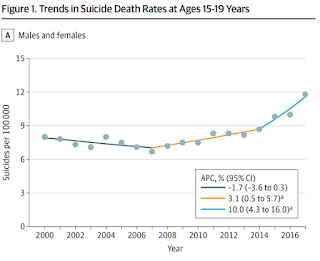Teen Suicide (10/7)
Teen Suicide
Another day at school, another assembly, another memorial for a kid you didn't even know the name of until they were gone. It becomes routine. You hear someone is gone, you collectively mourn-- even if you didn't know them, you leave condolences on social media, and then you're back to your normal life as if they were never gone. Or maybe, as if they never even existed to begin with. The first few times it stings. It's hard hitting. It hurts. This isn't supposed to happen. Until it happens again, then again. Then once more, until any grief you could have felt is sucked away, instead replaced with a numb acknowledgement that someone else has passed. The list of reasons is endless: burnout, bullying, abuse at home, trauma, mental illness, and more. It's getting unbearable. Years tick by and the numbers only continue to grow. A steady increase on a graph that feels almost degrading to measure. But why, what's changed? Why have the rates risen so abruptly in such a short period of time?
Some people point to social media. Others to increased expectation, rise in responsibility, and thd collapse of the world around us. All could be true; or maybe there's scientific reason. Maybe, Death lurks behind a clipboard and lab coat, jotting down notes of the rise in test subjects. According to USA Today, the teen suicide rate between ages 10 to 17 has gone up 70% between 2006 and 2016. The issue only continues to grow as more years tick by. In various studies, it's shown that the leading causes of teen suicide appear to be conflicts at home. Either separation of parents or some form of abuse. In a 2009 study done by Child Trends, it showed how 14% of teens reported to have seriously thought about or planned out in detail a suicide attempt. 8% had attempted to take their own life. While those numbers are scary, the staggering statistic that stands out is how many have succeeded. 12% of total teen deaths have been caused by suicide.
The issue prevails, and yet nothing seems to be done about it. At New Trier, it seems there's at least one suicide each year, and each time it's the same. There's a brief announcement, moment of silence, and then the next day everyone acts as if it never happened. Nobody asks why. Does anybody even care enough TO ask? That's the real question. Unfortunately, it's one that no amount of research can answer, so there's no conclusion. I couldn't find something backed by science and reason to satisfy the question nobody bothers to ask. There's no sign of change. No further regulation. Just a simple nod of condolence and then blissful ignorance until it happens again. But how much longer can we plead ignorance before we become as guilty as the problems that push kids off the edge? I don't know, I wish I did. Maybe things will change once I'm out of school, or maybe they'll get worse. All I know is that something needs to be done soon, but how many people will die before anyone gives them so much as a second thought?
The issue prevails, and yet nothing seems to be done about it. At New Trier, it seems there's at least one suicide each year, and each time it's the same. There's a brief announcement, moment of silence, and then the next day everyone acts as if it never happened. Nobody asks why. Does anybody even care enough TO ask? That's the real question. Unfortunately, it's one that no amount of research can answer, so there's no conclusion. I couldn't find something backed by science and reason to satisfy the question nobody bothers to ask. There's no sign of change. No further regulation. Just a simple nod of condolence and then blissful ignorance until it happens again. But how much longer can we plead ignorance before we become as guilty as the problems that push kids off the edge? I don't know, I wish I did. Maybe things will change once I'm out of school, or maybe they'll get worse. All I know is that something needs to be done soon, but how many people will die before anyone gives them so much as a second thought?
Picture from pbs.org

Hello, Genevieve! My name is Ms. Blair, and I have been observing your classroom for the past few weeks. I will also be student teaching in your class this winter. I am looking forward to getting to know you and your classmates throughout this school year!
ReplyDeleteYour post touches on a difficult phenomenon that affects many high school students, and your statistics clearly indicate the urgency of addressing this issue. How do you see the response (or lack thereof) to teen suicides connect to or contradict any of the values discussed in class? In particular, what values could student activists, mental health advocates, etc. draw upon to help call more attention to teen suicide?
Geneivieve, you rightly call attention to homophobia and race (and implicitly to the intersectionality of these sources of intolerance). In fairness to Coates, perhaps, we might say he confesses to his former homophobia, no? I'd like to see you analyze language more fully though -- the Coates quotes you do cite and the outside source you offer.
ReplyDelete